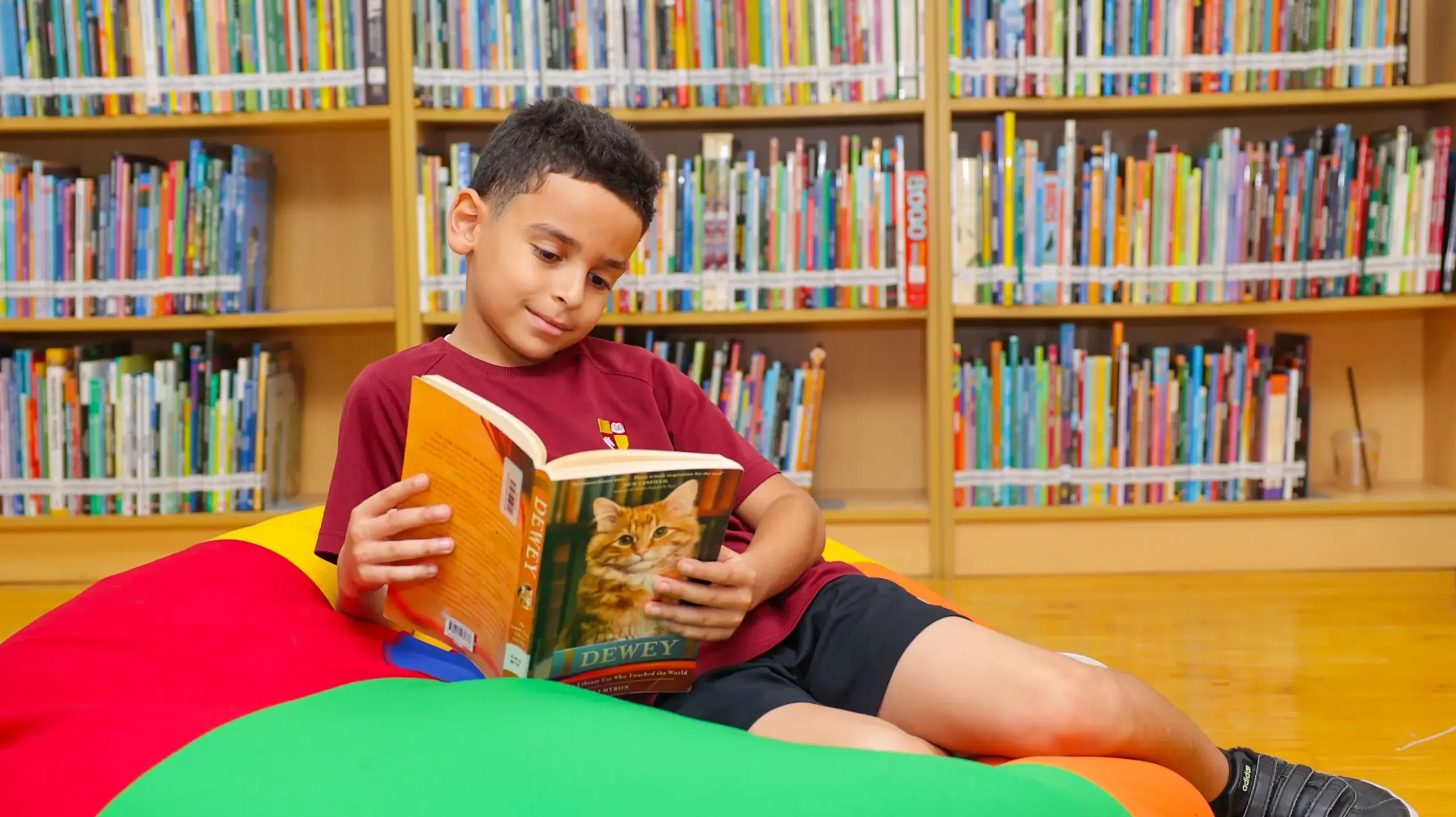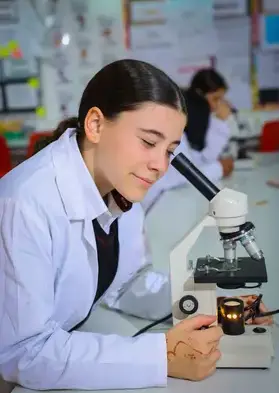The Middle Years Programme (MYP) is a five-year programme that encourages students to make practical connections between their studies and the real world.
The result is young people who are creative, critical and reflective thinkers. The MYP builds on the knowledge, skills and attitudes developed by the IB Primary Years Programme (PYP). Students who complete the MYP are well-prepared to undertake the IB Diploma Programme (DP).
The MYP model shows an overview of the various aspects of the programme:
In the programme model for the MYP, the first ring around the student at the centre describes the features of the programme that help students develop disciplinary (and interdisciplinary) understanding.
- Approaches to learning (ATL) — demonstrating a commitment to approaches to learning as a key component of the MYP for developing skills for learning.
- Approaches to teaching — emphasising MYP pedagogy, including collaborative learning through inquiry.
- Concepts — highlighting a concept-driven curriculum.
- Global contexts — showing how learning best takes place in context.
The second ring describes some important outcomes of the programme.
Inquiry-based learning may result in student-initiated action, which may involve service within the community. The MYP culminates in the personal project (for students in MYP year 5) or the community project (for students in MYP years 3 or 4).
The third ring describes the MYP’s broad and balanced curriculum.
The MYP organises teaching and learning through eight subject groups:
| Language and Literature | Language Acquisition |
| Individual and Societies | Sciences |
| Mathematics | Arts |
| Physical and Health Education | Design |
In many cases, discrete or integrated disciplines may be taught and assessed within a subject group: for example, history or geography within the individuals and societies subject group; biology, chemistry or physics within the sciences subject group.
The distinction between subject groups blurs to indicate the interdisciplinary nature of the MYP. The subject groups are connected through global contexts and key concepts.
The programme has been developed with developmentally appropriate attention to:
| Conceptual understanding | Teaching and learning in context |
| Approaches to learning (ATL) | Service as action (community service) |
| Language and identity | Learning diversity and inclusion |
What matters is not the absorption and regurgitation either of facts or of predigested interpretations of facts, but the development of powers of the mind or ways of thinking which can be applied to new situations and new presentations of facts as they arise.
Alec Peterson, first IB Director General 2003: 47
A concept-driven curriculum encourages idea-centred teaching and learning. The MYP prescribes key concepts (overarching) and related concepts (subject-specific) to better ensure a common basis of conceptual understanding is developed in MYP schools that will provide students with a sound foundation for future learning.
According to Erickson (2008), concepts range from macro to micro in terms of scope, but all concepts meet the following criteria.
- Valued and meaningful across time, place and space
- Abstract
- Concise (represented by one or two words, or a short phrase)
- Express common attributes of specific examples
Concepts are used at different levels of generality and complexity, serving different purposes in teaching and learning. Erickson (2007: 72–78) describes a concept-based curriculum as “three-dimensional”, focusing on concepts, facts and skills rather than the traditional “two-dimensional” curriculum that considers only facts and skills.
MYP programme design uses two kinds of concept.
- Key concepts, contributed from each subject group, provide interdisciplinary breadth to the programme. Key concepts are broad, organising, powerful ideas that have relevance within and across subjects and disciplines, providing connections that can transfer across time and culture.
- Related concepts, grounded in specific disciplines, explore key concepts in greater detail, providing depth to the programme. They emerge from reflection on the nature of specific subjects and disciplines, providing a focus for inquiry into subject-specific content.
The heart of contextual teaching and learning is the connection that leads to meaning. When young people can connect the content of an academic subject … with their own experience, they discover meaning, and meaning gives them a reason for learning. Connecting learning to one’s life makes studies come alive.
Johnson 2002
Teaching and learning in the MYP involves understanding concepts in context. All learning is contextual. A learning context is a specific setting, event or set of circumstances, designed or chosen, to stimulate learning.
Concepts are powerful abstract ideas that have universal application, but the meaning of concepts can change as people experience and interpret them in different contexts. Contexts offer the possibility of new perspectives, additional information, counter-examples and refinements of understanding.
In the MYP, learning contexts should be (or should model) authentic world settings, events and circumstances. Contexts for learning in the MYP are chosen from global contexts to encourage international-mindedness and global engagement within the programme.
Through ATL in IB programmes, students develop skills that have relevance across the curriculum that help them “learn how to learn”. ATL skills can be learned and taught, improved with practice and developed incrementally. They provide a solid foundation for learning independently and with others. ATL skills help students prepare for, and demonstrate learning through, meaningful assessment.
In summary the learning in an MYP classroom shows the following:
- MYP students start with a statement of inquiry and develop concepts in global contexts.
- Each unit in MYP has one key concept and one or more related concepts.
- Teachers and students develop a statement of inquiry using the key concept and related concepts which are then used to formulate inquiry questions.
- There are three types of inquiry questions factual, conceptual and debatable that helps unpack and explore the statement of inquiry.
- Through their inquiry, students develop specific interdisciplinary (ID) and disciplinary approaches to learning skills (ATLs).
APPROACHES TO LEARNING SKILLS IN MYP
Through ATL in IB programmes, students develop skills that have relevance across the curriculum that help them “learn how to learn”. ATL skills can be learned and taught, improved with practice and developed incrementally. They provide a solid foundation for learning independently and with others. ATL skills help students prepare for, and demonstrate learning through, meaningful assessment. They provide a common language that students and teachers can use to reflect on, and articulate on, the process of learning.
IB programmes identify five ATL skill categories, expanded into developmentally appropriate skill clusters.
| Communication | social | self-management | research | thinking |
|---|---|---|---|---|
| Communication Skills | Collaboration Skills | Organization Skills | Information Literacy Skills | Critical Thinking Skills |
| Affective Skills | Media Literacy Skills | Creative Thinking Skills | ||
| Reflection Skills | Transfer Skills |
| Read more |
|---|
|
The focus of ATL in the MYP is on helping students to develop the self-knowledge and skills they need to enjoy a lifetime of learning. ATL skills empower students to succeed in meeting the challenging objectives of MYP subject groups and prepare them for further success in rigorous academic programmes like the IBDP and the IBCP. In the MYP, ATL encompasses both general and discipline-specific skills. Many ATL skills are applicable to all MYP subject groups; these general “tools for learning” can be tailored to meet the specific needs of students and schools. In order to develop ATL skills that facilitate effective and efficient learning, students need models, clear expectations, developmental benchmarks (or targets) and multiple opportunities to practise. While ATL skills are not formally assessed in the MYP, they contribute to students’ achievement in all subject groups. The most effective way to develop ATL is through ongoing, process-focused disciplinary and interdisciplinary teaching and learning. This can be achieved by using a wide range of content, developed through MYP key and related concepts and global contexts, as a vehicle for teaching effective learning strategies. Likewise, ATL skills can be powerful tools for exploring significant content. This dual focus (content and process, knowledge and skills) promotes student engagement, deep understanding, transfer of skills and academic success. |
Over time, students should develop clear and sophisticated understandings of how they learn best and how they can evaluate the effectiveness of their learning. This kind of self-regulated (independent and autonomous) learning helps students:
| Reflect purposefully on their learning (metacognition) |
| Understand the diversity of human learning needs |
| Evaluate and provide evidence of their learning |
| Meet MYP subject group aims and objectives |
| Share responsibility for creating productive, cooperative and safe learning environments |
| Develop the confidence to try new strategies and explore new concepts and contexts for learning |
| Prepare for further study and responsibility participation in local and global communities |
| Read more |
|---|
|
ATL skills are informed by, and support the development of, the attributes of the IB learner profile. They are often interconnected. Individual skills and skills clusters frequently overlap and may be relevant to more than one skill category. Some of the key questions to be answered by students with respect to ATL skills include the following:
When specific ATL skills become an explicit focus for teaching and learning, students can begin to take responsibility for their own development. Over time, students can identify themselves and their competence in any learning strategy using terms like the following.
A concept-driven curriculum that uses ATL skills effectively enables all students to become stronger, more self-regulated learners. The following tables show the ATL skills framework that will be used over the five-years of MYP in the various activities in class, assessments (formative and summative), projects and external examinations. |
| INTERDISCIPLINARY LEARNING IN MYP |
|---|
|
One of the key features of the MYP is its emphasis on interdisciplinary teaching and learning. This trait emerges as a consequence of the challenges and opportunities of educating students in, and for, a complex and highly interconnected world. Younger learners often make connections naturally between knowledge domains in order to understand the world around them—in some cases, because they have not yet been socialised into the disciplinary perspectives that organise the academic world. As knowledge and information multiply, critical thinkers must successfully integrate disciplinary perspectives to understand complex issues and ideas. |
| GLOBAL CONTEXT IN MYP |
|---|
|
The MYP is designed for students aged 11 to 16. It provides a framework of learning that encourages students to become creative, critical and reflective thinkers. The MYP emphasises intellectual challenge, encouraging students to make connections between their studies in traditional subjects and the real world. It fosters the development of skills for communication, intercultural understanding and global engagement—essential qualities for young people who are becoming global leaders. The MYP is flexible enough to accommodate the demands of most national or local curriculums. It builds upon the knowledge, skills and attitudes developed in the IB Primary Years Programme (PYP) and prepares students to meet the academic challenges of the IB Diploma Programme (DP) and the IB Career-related Programme (IBCP). |
| my projects |
|---|
|
Teaching and learning in the MYP involves understanding concepts in context. Global contexts provide a common language for powerful contextual learning, identifying specific settings, events or circumstances that provide more concrete perspectives for teaching and learning. Students at the MYP age range learn best when their learning experiences have context and are connected to their lives and to the world that they have experienced. When learning becomes meaningful and relevant, students are more likely to be engaged. |
| ASSESSMENT IN MYP |
|---|
|
Regular internal assessment and reporting play a major role in the students’ and parents’ understanding of the objectives and criteria, in the students’ preparation for final assessment, and more generally in their development according to the principles of the program. The MYP offers a criterion-related model of assessment. Teachers are responsible for structuring varied and valid assessment tasks that will allow students to demonstrate achievement according to the required objectives within each subject group. In the MYP, teachers make decisions about student achievement using their professional judgment, guided by mandated criteria that are public, known in advance and precise, ensuring that assessment is transparent. |
| CERTIFICATION IN MYP |
|---|
| MYP Years 4 and 5 are a crucial 2-year period before the completion of the Middle Years Programme. Some schools around the world only offer this two-year programme instead of the whole 5-year programme. This prepares our students very well to take on the next programme which is IBDP. |
The two-year Middle Years Programme culminates in the following key assessments:
| Approaches to Learning (ATL) Skills |
|---|
| Students will be assessed on the ATL skills that they have acquired over the two year period. Teachers will work with them in various units across the eight subject groups and develop the 10 main ATL skill clusters. This will be assessed in the ongoing summative assessments as well as the personal project in MYP year 5 (Grade 10). |
| Personal Project (PP) |
|---|
| Students will be required to complete a mandatory personal project. The journey of the PP will commence in December of 2017 in Grade 9 with an information session. The main idea of the information session is to provide information on the three parts of the PP (process journal, product and report) and to discuss the assessment criteria. Students will be assigned PP Supervisors who will guide them in the topic areas of their choice. The supervisors will then monitor the progress of the PP. Following the successful completion of the PP, teachers will assess it and send it to the IB for external moderation. Students will present their PP in an exhibition that will be organised for them in school. |
| e-Assessments |
|---|
| There are two types of eAssessments: on-screen examinations and ePortfolios. Students may be registered for on-screen examinations for English, Mathematics, Science, History/Geography and Interdisciplinary assessment (ID). Students may submit ePortfolios for Language Acquisition, Arts, Design and PHE. Please bear in mind that eAssessments are optional. 80% of the schools around the world do not register their students for eAssessments. At RWA we would like to offer our students the opportunity to register for eAssessments. |
| Inter-disciplinary (ID) assessment |
|---|
|
Each year the IB selects a global context and informs MYP schools in December. The Personal Project and the following eAssessments are then centred around this context. The school also receives information about the two subject groups with the relevant source material that students will be required to use for their ID Assessment. Students will prepare for their IDU exam starting MYP Year 4 and then may complete an exam in MYP Year 5. MYP Certification: All students who are registered for MYP are eligible for two types of certificates:
Irrespective of the certificate, the Middle Years Programme empowers students with the requisite skills to take on the Diploma Programme or the Career-related Programme at RWA. |
| How do I get a MYP Course Results Certificate? |
|---|
|
All students registered for any combination of subjects, the Interdisciplinary assessment and the personal project are referred to as an MYP Course Candidate. Completion and submission of the personal project is mandatory for all MYP Course Candidates. MYP Course candidates may receive an MYP Course Results document recording all their achievements. In addition to the MYP Course Results, candidates may apply for another certificate which is the MYP Certificate. As eAssessments are optional, students will be advised to register for those subjects that will best demonstrate their strengths. |
| How do I get a MYP Certificate? |
|---|
|
To be eligible for the MYP Certificate a candidate must:
|
| what does the MYP Certificate include? | ||||||
|---|---|---|---|---|---|---|
|
A grade from at least one subject from each of the following six subject groups:
A candidate may register for any number of subjects (including language acquisition, arts, physical and health education, and design), but only six subjects contribute to the award of the MYP Certificate. If a candidate takes more than one subject from the same subject group, the highest grade will count towards the certificate. Where a candidate chooses to take multiple subjects from arts, physical and health education or design, the highest single grade from these subject groups will count towards the certificate. For each subject, one from each of the minimum six subject groups, up to 7 points can be obtained. Additionally, the interdisciplinary assessment can contribute up to 7 points and the personal project another 7 points. To achieve the MYP Certificate a candidate must gain at least 28 points overall, but a grade 1 or grade 2 in any subject, the interdisciplinary assessment or the personal project cannot contribute to the award of the MYP Certificate. |
| POLICIES AND RESOURCES |
|---|







